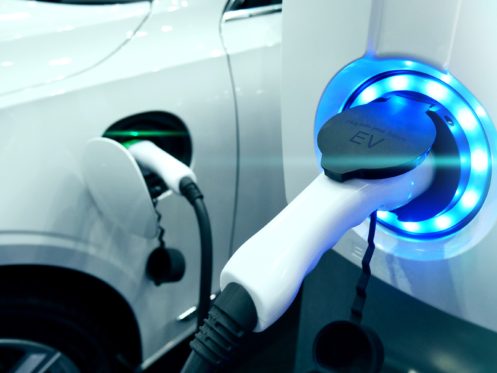When you have installed charging stations for electric vehicles at your home or business premises, it is necessary that you check the suitability of your electrical system. This needs to be done to ensure that there is no adverse impact due to the power draw from these charging stations. Thus, to avoid any damage or disruption in the electricity supply, the first thing you need to do is examine the current electrical system of your place carefully, and then, find out if it can support the installation of such charging stations.
What Is an EV Charger?
An EV charger or electric vehicle supply equipment (EVSE) is a device that supplies electrical energy for the recharging of electric vehicles or batteries used in hybrid electric vehicles. There are three main types of EV chargers.
Level 1 (110V)
Chargers plug into a standard 120-volt AC outlet (15-amp circuit recommended) and charge most EVs in eight to 12 hours. These are the slowest, cheapest chargers available, but they’re still very convenient because they can be installed at home and used with a regular extension cord.
Level 2 (240V) chargers
These are the most common types of electric vehicle charging stations. Level 2 EV Charging Stations can be hardwired to your home or business but are plugged into a standard outlet. They’re typically installed in a garage or a public parking lot, and capable of charging an EV at a rate of 12 or 30 miles per hour, which makes them much faster than Level 1 chargers.
DC Fast Chargers
These are the fastest and newest electric vehicle charging stations available. DC fast chargers can charge an EV at rates as high as 50 miles per hour and are generally installed in public parking lots or commercial buildings. Since their introduction, DC fast chargers have made long road trips possible for EVs.
How Do EV Chargers Work?
EV chargers work by sending alternating current through the vehicle’s charging port and then through induction coils; this creates magnetic fields in which electrons flow through the metal cable lines and into the battery. In essence, an EV charger takes electricity from a wall outlet and makes it usable for your car.
Different manufacturers offer different ways of powering an EV because some designs are better than others. For instance, some EV chargers take advantage of standard outlets whereas others use special plugs explicitly designed to charge EVs. Some EV chargers are also portable, meaning you can easily move them from place to place; other EV chargers must remain in one location because they have been permanently attached to a wall outlet.
Factors to Consider When Choosing Installation Services for Your EV Charger
Here are some factors to consider when choosing an installation service for your EV charger:
Installation Location
If you’re installing a permanent home charger, it’s essential to ensure that trees will not obstruct the location as they grow. Consider whether the area will be free of snow in winter and parked vehicles in summer. Select a spot for your charger that provides easy access for you and does not create safety concerns for others who may not know how to operate it properly (for example, children).
Individual Needs
Be sure to discuss your needs with the installer. You may want to consider the following: time of installation, additional work, such as conduit or trenching, and whether the location requires a building permit — this is often only needed if you plan on having an electrician do additional work. Also, consider the EV charger compatibility. You must make sure the type of your EV charger matches the port on your vehicle. Some cars have a level 1 or level 2 charging port while others have both types. On the other hand, If you own a fleet of EVs or plan to let others charge their vehicles at your home, your needs will likely be different from those of a single driver or a small family.
Power
You need to ask yourself questions like is there enough power for my EV? Or, do I need to get extra electricity from the utility company? When you have installed charging stations for electric vehicles at your home, it is necessary that you check the suitability of your electrical system. This ensures no adverse impact on it due to the power drawn from these charging stations. Thus, to avoid any damage or disruption in the electricity supply, the first thing you need to do is examine the current electrical system of your place carefully, and then, find out if it can support the installation of such charging stations.
Installation Cost
The installation cost can vary greatly depending upon where and how your charging station is installed. Government incentives may also be available in some areas to help reduce costs or cover them entirely. Cost should not be the only factor when selecting an installer; make sure that their reputation and references match what you expect from them at the end of the project.
Installation Timeframe
The time it takes to install your station will depend upon where it’s being installed, what kind of work needs to be done, how many electrical circuits are in place already, and whether you need to obtain permits. It’s essential to have a realistic view of how long it will take, which can help you avoid surprises concerning costs, timelines, etc. Generally, the more complicated the installation, the more time and money it will cost you.
Advantages of Hiring a Professional to Install Your EV Charger
Hiring an experienced and trustworthy electrician is the right thing to do when you have a project that involves electricity. Here are some of the tipping points of hiring one:
Reliability
You can hire an electrician to help you develop a plan on how best to connect your EV charger to your home. Additionally, the company has experience installing EV chargers, so they know how to do the job quickly and efficiently. They’ll be able to handle whatever unexpected problems might come up, and they’ll use high-quality parts that won’t break down quickly.
Warranties
Hiring a pro also can save you money down the road. Most EV charging station manufacturers offer warranties on their products. Still, to take advantage of them, you need to buy them directly from the manufacturer or through an authorized dealer.
Compatibility
Another primary reason to hire a professional is to make sure your charging station works with your car’s onboard charger and plug-in port. Though you may think it would be easy to install the proper hardware, it’s essential to realize that the right hardware can depend on several factors, for example, the make and model of your car, its onboard charger, as well as how much amperage it draws from the plug-in port.
In conclusion, we recommend calling on the services of a registered and licensed electrician. Our technicians at Home Team Electric are ready to help. We also do electrical upgrades, lighting services, surge protection, ceiling fan installations, code compliance, and more. We serve residents of Coachella Valley, Morongo Basin, and surrounding areas. Call Home Team Electric today for more information.




